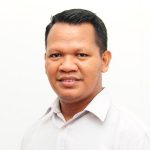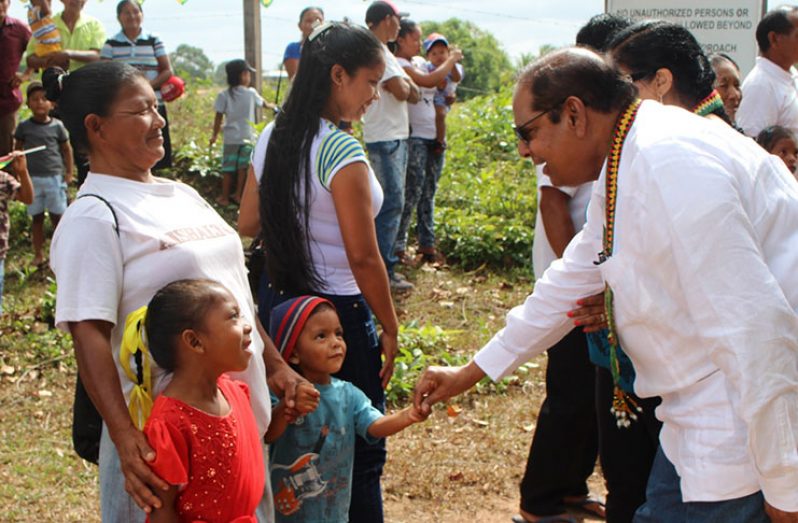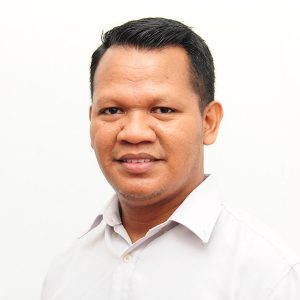— Aishalton residents urged at launch of International Year of Indigenous Languages
RESIDENTS of Aishalton, Deep South Rupununi were told to ensure the preservation of indigenous languages as government and the United Nations Educational, Scientific and Cultural Organisation (UNESCO) officials visited the community to launch International Year of Indigenous languages.
The event , which was held on Saturday under the theme ‘Indigenous languages are important to sustainable development, peace-building and reconciliation’, saw a large turnout of residents who heard for the first time on local radio, descendants of the nine indigenous tribes speak in their own language at a forum.
The forum was organised by the Ministry of Indigenous Peoples’ Affairs and the University of Guyana.

The activity was a spectacle which left many in awe, including Prime Minister Moses Nagamootoo, who is performing the duties of President; Minister of Indigenous Peoples’ Affairs, Sydney Allicock; Junior Minister of Indigenous Peoples’ Affairs, Valerie Garrido-Lowe; and UNESCO’s representative Patrice La Fleur among others.
The prime minister, who gave the feature address, described the occasion as historic, while noting that the launch of the event was held at a time when the authorities are trying to introduce indigenous languages into the education system.
After listening to the nine indigenous representatives speak in their own languages, those being the Arawak, Carib, Warrau, Patamona, Wapishana, Macushi, Arecuna, Wai Wai and the Akawaio descendants, the prime minister noted that the languages are “in good hands.”
Nagamootoo said many persons are unaware of the languages spoken globally and during his address, told the gathering that one of the plans of the authorities is to have the country’s indigenous languages being aired on the radio. To this end, he continuously cited the importance of Radio Aishalton which was launched in 2018 and several other radio stations which the government launched countrywide since assuming office in May 2015.
FOOD FOR THE MIND
He said that radio provides “food for the minds, nourished with entertainment and feed our appetites even when we relax and enjoy pleasure.”
The prime minister also noted that radio in the hinterland provides an opportunity for indigenous peoples to connect and he cited the preservation of languages spoken in indigenous communities as one way of bringing the people together.

“We have to appreciate and love our languages, ” Nagamootoo said, as he urged residents and those listening via Radio Aishalton and the National Communications Network, to learn and spread them. “Hold onto your languages,” the prime minister urged.
“It is said that an informed population is an educated population,” he added as he insisted that Guyana’s indigenous peoples must not be left behind.
Minister Allicock told the gathering that Saturday’s event was one of the most important ones for the indigenous peoples, as he noted that government is in full support of the preservation of indigenous languages.
“We would like to see that these rich cultures are preserved,” he said as he underscored that the citizenry comes first.
Allicock said 2019 has a special purpose, one in which the launch of the recognition of the indigenous language is put to the fore.
“Languages play an extremely crucial role in everyday life,” he noted. He said the languages continue to disappear globally at an extremely alarming rate and he noted that Guyana cannot afford to lose its languages.
Allicock said Saturday was a prime example of language preservation in which the nine representatives spoke in their respective indigenous languages. He said it is a method to strengthen the country’s development as a whole.
ACTION
UNESCO’s representative Patrice Le Fleur told the gathering that the UN permanent forum on indigenous issues drew attention to the threats and loss of languages and acted to have them re-invented at universities and public centres.

She spoke on Article 13 of the UN Declaration on the Rights of Indigenous Peoples which states that Indigenous peoples have the right to revitalise, use, develop and transmit to future generations their histories, languages, oral traditions, philosophies, writing systems and literatures, and to designate and retain their own names for communities, places and persons.
Le Fleur, like previous speakers, urged residents and listeners to ensure that indigenous youths know their languages.
Alim Hussain of the Faculty of Education, Department of Languages at UG, said the fact that three officials of the department, including him, were at the event is a sign that the university is interested in the indigenous languages.
He said revival of the language by the Ministry of Education, in which the Wapichan language is being taught in schools in the Rupununi as a pilot programme, is an important step and one that is necessary. He said after listening to the speakers who spoke their respective indigenous languages, he is proud of the fluency with which they spoke and the value they placed on their language.
He said the university is prepared to work with the indigenous population do research and assist them to preserve their respective languages.
“This is a very important part in building our nationhood,” he added. He expressed hope that awareness balloons nationally.
Last year, the United Nations designated 2019 as The Year of Indigenous Languages. The UN has explained that having recognised their vulnerability, the agency has proclaimed 2019 the International Year of Indigenous Languages, “to draw attention to the critical loss of indigenous languages and the urgent need to preserve, revitalise, and promote indigenous languages.”




.png)









